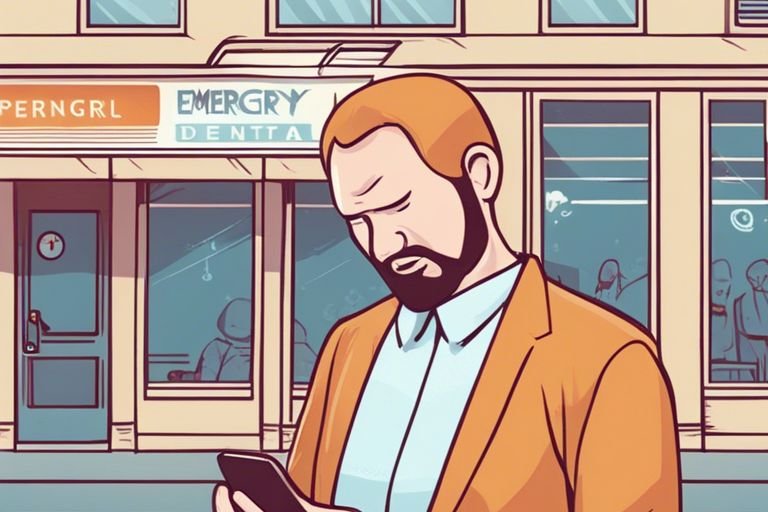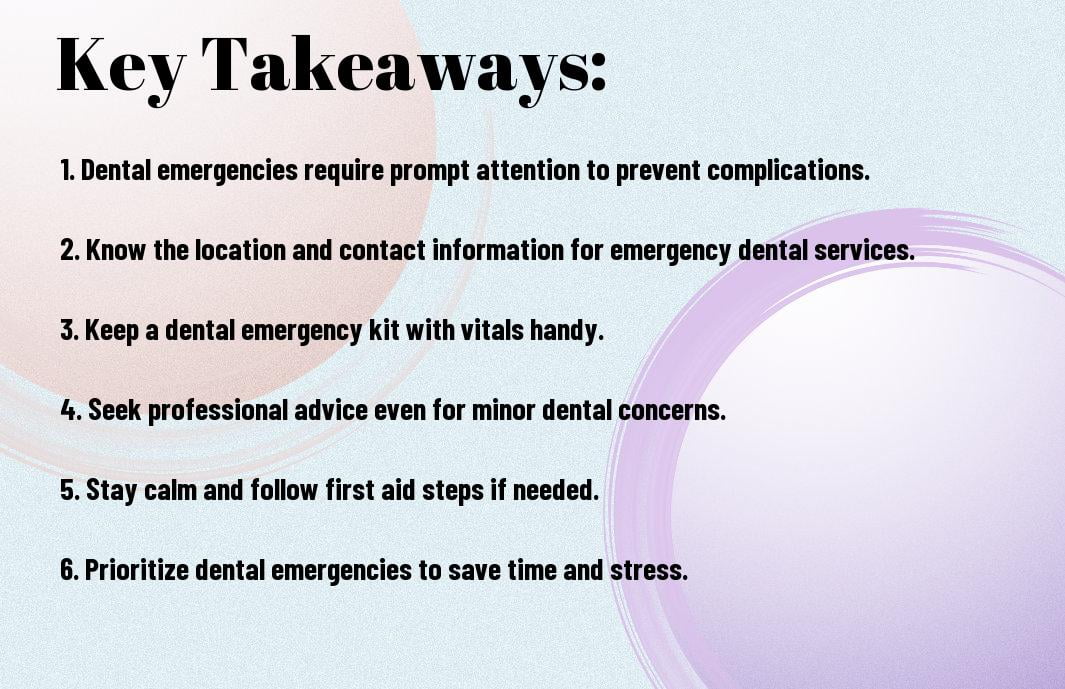Just when you least expect it, a dental emergency can arise, causing pain and discomfort. Knowing how to navigate these situations and access immediate care is crucial for your oral health. Whether it’s a severe toothache, a broken tooth, or an injury to the gums, timely action can prevent serious complications. In this blog post, we will discuss how to recognize a dental emergency, steps you can take to manage the situation, and where to find immediate care when you need it most.
Key Takeaways:
- Identify Emergency Symptoms: Recognizing signs like severe toothache, broken or knocked out tooth, facial swelling, or signs of infection are crucial in determining the need for immediate dental care.
- Have Emergency Contact Information Handy: Keep contact numbers of emergency dental services or your dentist easily accessible to quickly seek help in case of a dental emergency.
- Act Promptly and Seek Immediate Care: Don’t delay seeking help if you experience a dental emergency. Prompt action can prevent further complications and increase the chances of saving a tooth or resolving the issue effectively.
Understanding Dental Emergencies
To effectively navigate dental emergencies, it is crucial to understand what constitutes a dental emergency and how to respond promptly.
Types of Dental Emergencies
- Toothache: Intense or persistent pain in the tooth or jaw.
- Cracked or Broken Tooth: A fracture in the tooth that exposes nerves.
- Knocked-Out Tooth: Complete dislodgement of the tooth from its socket.
- Lost Filling or Crown: Exposed tooth is vulnerable to further damage.
- Infection or Abscess: Swelling, pus, and severe pain in the gum.
With this understanding, you can identify a dental emergency and seek immediate care. Perceiving the severity of the situation is crucial in preventing further complications.
Signs and Symptoms to Watch For
Types of dental emergencies can manifest through various signs and symptoms that should not be ignored. Symptoms such as severe tooth pain, swelling in the face or gum area, and bleeding that won’t stop are indicators of a potentially serious issue. If you experience any of these symptoms, seeking emergency dental care is imperative to prevent further complications.
Preparing for Dental Emergencies
Some situations can arise when you least expect it, such as a sudden toothache or a broken tooth. Being prepared for dental emergencies can make all the difference in getting timely and effective treatment when you need it most.
The Essentials of an Emergency Dental Kit
For managing dental emergencies on the go, having an emergency dental kit can be invaluable. Include items such as gauze, a small container with a lid for lost teeth, over-the-counter pain medication, and the contact information of your emergency dentist. Having these vitals readily available can help alleviate discomfort and provide temporary solutions until you can see a dental professional.
When to Seek Immediate Help
The moment you experience severe pain, sustained bleeding, or trauma to the face or mouth, it’s crucial to seek immediate help from a dentist or emergency room. Ignoring these symptoms can lead to further complications and jeopardize your oral health. It’s important to act promptly in emergency situations to prevent permanent damage.
Accessing Emergency Dental Services
Finding an Emergency Dentist
Keep calm in a dental emergency and act promptly to find an emergency dentist who can address your urgent dental needs. Start by calling your regular dentist’s office. They may have provisions for emergency dental care or be able to refer you to a trusted emergency dentist. If it’s after hours, look up local emergency dental clinics or call a dental emergency hotline for assistance.
What to Expect During an Emergency Dental Visit
Accessing emergency dental services means immediate relief from pain and professional treatment for your dental issue. For emergency visits, expect the dentist to assess your condition quickly and determine the best course of action. They may take X-rays, provide pain relief, and address the immediate concern. If your tooth has been knocked out, swift action within the first hour offers the best chance of saving it.
To ensure you receive the best care during an emergency dental visit, be prepared to provide details about your symptoms and any relevant medical history. The dentist will explain the treatment plan, including any follow-up care that may be needed. Rest assured that emergency dentists are equipped to handle a wide range of dental emergencies, from severe toothaches to broken teeth.
Managing Pain and Discomfort
Temporary Solutions for Pain Relief
All dental emergencies can be distressing, especially when they involve significant pain. For immediate relief, over-the-counter pain medications such as ibuprofen can help in managing discomfort. Avoid aspirin for dental pain as it can increase bleeding. Applying a cold compress to the outside of the mouth near the affected area can also help to numb the area and reduce inflammation temporarily.
Aftercare and Preventing Further Issues
Solutions for aftercare following a dental emergency are crucial to prevent further issues. Rinsing the mouth with warm saltwater can help reduce pain and swelling. Avoiding hot or cold foods and drinks can also prevent aggravating the affected area. It is crucial to maintain good oral hygiene practices, including gentle brushing and flossing, to keep the area clean and promote healing.
Further, if the pain persists or worsens, it is vital to seek immediate professional dental care to address the underlying problem and prevent any complications from arising. Delaying treatment can lead to more severe issues and additional discomfort.
Summing up
To wrap up, knowing how to navigate dental emergencies and access immediate care when you need it most is crucial for maintaining good oral health. By being prepared with knowledge of what constitutes a dental emergency, understanding how to find emergency dental services, and knowing how to handle common dental emergencies at home, you can ensure that you receive timely and appropriate care. Taking quick action in a dental emergency can make all the difference in preventing further complications and saving your teeth. Remember to stay calm, seek professional help when needed, and prioritize your oral health to prevent emergency situations whenever possible.
FAQ
Q: What are common dental emergencies that require immediate care?
A: Common dental emergencies that require immediate care include severe toothache, knocked-out teeth, cracked or fractured teeth, and abscess or infection in the mouth.
Q: How can I access immediate dental care in case of a dental emergency?
A: When faced with a dental emergency, you can contact your regular dentist for advice or seek treatment at an emergency dental clinic. If the emergency occurs after hours, you can go to the nearest emergency room for immediate care.
Q: What should I do if I experience a dental emergency while traveling?
A: If you experience a dental emergency while traveling, you can search for local emergency dental services in the area or contact your travel insurance provider for assistance. It is also recommended to carry a dental emergency kit while traveling to address minor issues temporarily.







